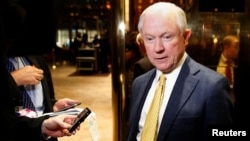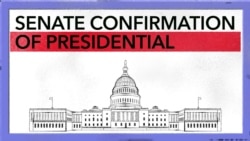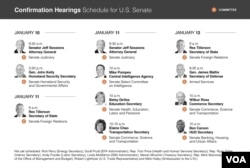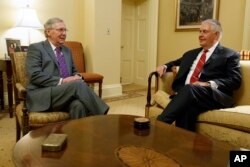The U.S. Senate will be ground zero beginning Tuesday for the first major battle of the incoming Trump administration: a rigorous and contentious confirmation process for the president-elect's Cabinet nominees and other top administration picks.
Hearings for eight Trump nominees will be held this week, beginning with Republican Senator Jeff Sessions of Alabama, tapped to be America's next attorney general.
Sessions is likely to face tough questions from Democrats about his relations with blacks and his past efforts fighting immigration reform. Thirty years ago, the Senate rejected his nomination to be a federal judge because of allegations he had made racially insensitive remarks, a charge Sessions denied.
He was the first senator to endorse Trump's presidential bid at a time when political Washington thought the billionaire real estate mogul turned politician had no chance of winning the Republican presidential nomination, let alone a four-year term in the White House.
President-elect Donald Trump called the 70-year-old Sessions "a high quality man."
Speaking to VOA Monday, Wyoming Republican Senator John Barrasso said he hoped the confirmation process would be swift, like it was four years ago.
“When President Obama came into office [in 2009], he had his Cabinet – a core working group – confirmed the first day,” he said. “And I would hope that we have that same situation with President Trump when he takes office on January 20.”
For his part, President-elect Donald Trump predicted Monday that the Senate will confirm all of his Cabinet choices. He made the prediction in New York, where he continued to meet with business and political leaders, 11 days ahead of his inauguration as the country's 45th president.
"I think they'll all pass," Trump said, describing them as "all at the highest level."
WATCH: How confirmation process works
Information is lacking
But Democrats have raised strenuous objections, saying numerous Trump nominees have been slow to complete paperwork and release information considered to be standard requirements for Cabinet picks and federal agency heads.
"We are focused on not getting all the completed ethics forms, tax returns, and that's just unprecedented," Democratic Senator Amy Klobuchar of Minnesota told VOA. "We just want to have the information to see if there are any conflicts."
Senate Minority Leader Chuck Schumer, a New York Democrat, noted that Republicans demanded that Obama's nominees clear the same hurdles on ethics, FBI background checks, and financial disclosures prior to their confirmation hearings in 2009.
"Our requests are eminently reasonable," Schumer said. "I only ask that the Republican majority follow the same set of standards they had in 2009 when the shoe was on the other foot."
Republicans insist no Trump nominee will be able to flout confirmation requirements, even if Democrats do not believe the information provided is sufficient.
"Nobody has ever had all the information in these [confirmation] proceedings. But they [senators] will have adequate information, no question about that," Senator Orrin Hatch, a republican from Utah, told VOA. "It's our job to make sure we vet Cabinet level people. We're doing that and we will do it."
Wealth complicates vetting
But the director of the nonpartisan Office of Government Ethics has raised concerns that the sheer volume of nominees, the hectic pace of confirmation hearings, and the failure of some Cabinet picks to provide financial information has taxed the organization's ability to thoroughly vet them prior to the hearings.
Democrats say the problem is compounded by the composition of Trump's proposed inner circle.
"President-elect Trump's nominees pose particularly difficult ethics and conflict of interest challenges," Schumer said. "They come, many of them, from enormous wealth. Many have vast holdings in stocks, and very few have experience in government. So they have not been appropriately vetted for something like a Cabinet post before."
Wealth is an issue, Klobuchar agreed.
"When you have people with assets and ownerships all over the world that are billionaires, it just makes it all the more complicated," she said.
Senate Majority Leader Mitch McConnell, a Kentucky Republican, downplayed Democrats' concerns after meeting with Trump on Monday in New York.
"Everybody will be properly vetted as they have in the past, and I am hopeful it will get up to six or seven — particularly the national security team — on day one," McConnell told reporters.
Republicans control 52 seats in the 100-member Senate. Should they maintain party unity behind Trump's nominees, they can all but assure the president-elect's team will be confirmed. Democrats can delay votes but are unable to block nominees on their own.








